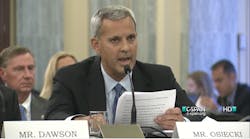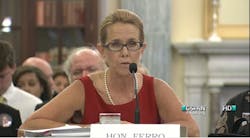A Senate subcommittee hearing on July 29 billed as a comprehensive look at truck safety challenges and opportunities in reality focused primarily on a single issue: Whether carriers should continue to abide by the current hours-of-service (HOS) restart provisions pending a study of their impact on safety, operations and driver health.
A provision that would suspend the changes in the HOS restart that took effect on July 1, 2013, is included in the Dept. of Transportation (DOT) funding bill approved in June by the Senate Appropriations Committee. The American Trucking Assns. (ATA) and its allies apparently had the votes to keep that provision in the bill, but Democrats were unable to bring the bill to the floor.
Although it certainly is possible that Congress will fund the federal government during fiscal 2015 through a series of short-term extensions, Congress probably at some point will approve the transportation funding bill as part of a larger package.
The appropriations panel approved the suspension over the objections of many Democrats on the Senate Commerce Committee, which oversees the Federal Motor Carrier Safety Administration (FMCSA) and had not even held a hearing on a suspension or study. So on Tuesday, the committee’s surface transportation subcommittee held that hearing.
Committee Chairman Jay Rockefeller (D-WV) noted in a written statement for the hearing that the trucking industry was trying to stop enforcement of the HOS restart changes. “They are pushing this significant legislative change as a rider on transportation funding bill without consideration by this committee and without a public comment process,” Rockefeller said. “Worse yet, this change could force tired truckers to get behind the wheel by allowing drivers to be on the road for more than 80 hours.”
Several Democrats echoed Rockefeller’s sentiments, including subcommittee Chairman Richard Blumenthal (D-CT) and Sen. Cory Booker (D-NJ), who was the primary sponsor of an amendment to kill the suspension of the HOS restart changes in the appropriations bill.
But the trucking industry also had supporters at the hearing, including subcommittee ranking Republican Roy Blunt (R-MO), who had voted for the appropriations committee language as a member of that committee, and Sens. Kelly Ayotte (R-NH) and Deb Fischer (R-NE).
Among the five organizations testifying at the July 29 hearing, ATA alone supported suspending the changes to the HOS restart.
“It is important to point out that ATA supports five of the six main components of the rules,” David Osiecki, ATA’s executive vice president and chief of national advocacy, told the subcommittee. “ATA’s only quarrel is with the restrictions recently placed on use of the restart provision. These restrictions are unwarranted, have unintended economic impacts, and may actually increase risk.”
Osiecki also argued that any questioning of the trucking industry’s commitment to safety is contradicted by the record.
“Our industry spends more than $7.5 billion each year on safety, and that investment is making a difference,” Osiecki said. “Over the past decade the number of large trucks involved in fatal crashes has dropped 17% – even with the industry operating an additional 2.7 million trucks and driving an additional 54 billion miles. More trucks, billions more miles, fewer crashes.”
Osiecki noted, however, that truck-involved crashes have risen in the past three years and that the federal government should turn its attention to activities that address the primary reasons for accidents. He argued that safety efforts should focus on driver behavior, including requiring speed limiters and stability control technology, expediting adoption of electronic logging devices and directing more inspection resources toward inspections following traffic enforcement stops rather than routine fix-station inspections.
In her final Congressional testimony as administrator of the FMCSA, Anne Ferro defended the HOS restart changes and the agency’s position that they should remain in place pending the study.Ferro (at right) cited the research behind the changes as well as follow-up work, including the field study released in January. And she she’s no justification for suspending the rule change pending the study.
“We have heard criticism that the new rule discriminates against nighttime drivers and forces them to drive during the day and in prime rush hours,” she told the subcommittee in her prepared testimony. “We have seen no evidence to support this claim.”
Ferro said that the rule does not prevent carriers and drivers from setting their own schedules or restrict drivers from being on the road during any time of the day. “Whatever the limits on driving and work hours may be, if the motor carrier and driver plan their schedule so tightly that the driver can barely complete the run legally, then problems with completing runs inevitably will occur,” Ferro said. “That fact cannot support any rollback of the current rule.”
In her live testimony, Ferro also said she had seen no documentation that the HOS rules were harming trucking companies, and she cited strong freight volumes and profits as contrary evidence.
Backing Ferro were the Commercial Vehicle Safety Alliance (CVSA), the Teamsters union and Advocates for Highway and Auto Safety.
For CVSA, the key concern with a potential suspension of the HOS restart changes is the disruption in enforcement and the administrative burdens for enforcement agencies that would result from having to retrain officers on the provisions prior to July 1, 2013, and then possibly having to train them still again if the study validates current rules.
“Legislating temporary changes to the HOS rules creates significant uniformity and consistency problems across the country,” said David Palmer, a major with the Texas Department of Safety and a past president of CVSA. “The impact of such an approach will create unnecessary upheaval for the States and cause significant operational and budgetary impacts on their enforcement efforts.”
In keeping with longstanding positions, Advocates for Highway and Auto Safety and the Teamsters union testified against suspending the HOS restart changes or allowing larger or heavier truck combinations.
To view a high-quality video recording of the hearing, click here.

